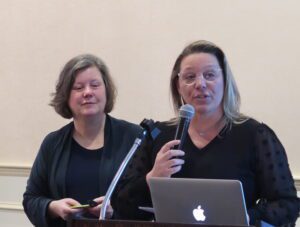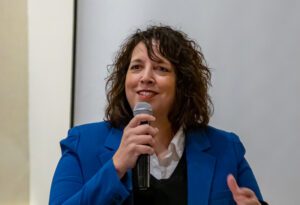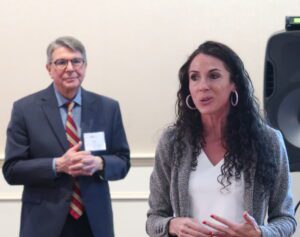Who is a member?
Our members are the local governments of Massachusetts and their elected and appointed leadership.
Municipal officials from across the western part of the state gathered in Holyoke on April 1 to hear from state officials and legislators about rural priorities and opportunities for collaboration.

Sen. Jo Comerford (left) and Rep. Natalie Blais (right) provide an overview of the legislative priorities of the Rural Policy Advisory Commission.
Sen. Joanne Comerford and Rep. Natalie Blais kicked off the Saturday meeting with an overview of the legislative priorities of the Rural Policy Advisory Commission, particularly in the categories of economic development, housing, transportation and municipal support. They also celebrated the Healey-Driscoll administration’s creation of a director of rural affairs within the Executive Office of Economic Development.
Comerford and Blais addressed some of the unique challenges facing the western part of the state, including a need for reliable public transportation, inadequate funding for maintaining roadways, and a declining population paired with a disproportionately aging population, which affects economic growth, school enrollments and housing.
“We need the grant programs from the state to match [the needs] we have here in western Mass.,” Comerford said. “We have a 13,000-unit gap in affordable housing. … We need workforce housing, we need housing for our elders, for people who can’t afford rents and house prices.
“We want to encourage people to come and live here, and we need housing to do that.”

Lt. Gov. Kim Driscoll addresses local and community leaders at the Massachusetts Select Board Association Western & Rural Massachusetts Conference in Holyoke on April 1. (Photo courtesy: Joshua Qualls/Governor’s Press Office)
Comerford and Blais discussed bills pending in the Legislature that address concerns regarding the local aid account known as PILOT, or payments in lieu of taxes for state-owned land, and the need for more funding and reform, as well as the need for a municipal building authority with a funding stream built in, which is of particular importance to smaller communities.
Blais said the PILOT formula “disproportionately disadvantages rural communities who are holding a lot of this land.”
Lt. Gov. Kim Driscoll, the keynote speaker for the event, discussed the administration’s priorities and her deep understanding, as a longtime mayor and local official, of the issues facing local governments across the state. She used most of her time to solicit feedback and concerns from attendees.
She said the Healey-Driscoll administration understands that “one size fits all does not work” and creates inequities.

Auditor Diana DiZoglio (front) discusses her office’s priorities with Ben Tafoya, director of the auditor’s Division of Local Mandates.
State Auditor Diana DiZoglio and Ben Tafoya, director of the auditor’s Division of Local Mandates, discussed the auditor’s priorities and recent studies on infrastructure updates, PILOT formula inequity, public safety staffing issues, and social service needs, as well as efforts to address inequities in the Chapter 90 formula while increasing the funding level.
“The challenges facing western Mass. are real,” DiZoglio said. “There is a crucial need for investments right now.”
Each of the speakers fielded questions and heard concerns from attendees. Formula-based funding inequities, broadband investment, regional school transportation, and public safety funding were common concerns.
The event closed with small group roundtable discussions about goals and priorities for the new director of rural affairs.
Presentations
• Rural Rescue Policy Issues – Office of the State Auditor
• Building Blocks of a Massachusetts Rural Agenda, by Sen. Joanne Comerford and Rep. Natalie Blais